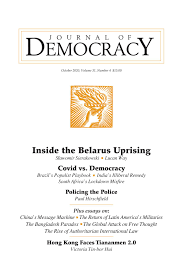 Just when liberal democracy looked on the point of collapse, a popular movement is resurrecting it in a country where it had seemed impossible, notes a leading analyst. The Belarusian protests are still far from achieving all their aims, but they have already made history, according to Sławomir Sierakowski (right), a Polish journalist, critic, and sociologist, is the founder and head of Krytyka Polityczna (Political Critique).
Just when liberal democracy looked on the point of collapse, a popular movement is resurrecting it in a country where it had seemed impossible, notes a leading analyst. The Belarusian protests are still far from achieving all their aims, but they have already made history, according to Sławomir Sierakowski (right), a Polish journalist, critic, and sociologist, is the founder and head of Krytyka Polityczna (Political Critique).
At times, countrywide, as much as 5 percent of the population has come out onto the streets for a single day’s demonstrations. And the unity that rapidly developed among various social groups has been remarkable: when workers went on strike in support of the marches, they got backing not only from students and intellectuals, but also from groups that in the past either did not exist or did not have a voice—hackers, for example: pro-democracy renegades from the country’s prosperous IT sector who have also played a vital part in events, he writes for The New York Review of Books.

Globsec
From exile, Belarus opposition leader Sviatlana Tsikhanouskaya called for a national strike on Oct. 26 if President Alexander Lukashenko has not left office, adds PRI’s The World. But in Belarus, police have been given permission to use lethal force against protesters, if necessary. The World’s Marco Werman speaks with Amnesty advocacy director Daniel Balson, a former Penn Kemble fellow at the National Endowment for Democracy, on the latest from Belarus.
Forty years after the emergence of Poland’s Solidarity movement, Belarus has its own August, adds Sierakowski, author of a compelling eyewitness account of the Belarusian social revolution in the latest issue of the Journal of Democracy:
 Once again, protests and strikes have broken out in a country that is both dependent on Russia and seen by Russia as within its immediate sphere of influence. And just as in 1980, not only is Western Europe relatively powerless to intervene, but it is also unclear how delighted European leaders are about the prospect of another crisis on their borders—a smoldering conflict like Ukraine’s that could lead to unforeseen geopolitical consequences, unrest and conflict, perhaps a humanitarian emergency leading to a wave of emigration.
Once again, protests and strikes have broken out in a country that is both dependent on Russia and seen by Russia as within its immediate sphere of influence. And just as in 1980, not only is Western Europe relatively powerless to intervene, but it is also unclear how delighted European leaders are about the prospect of another crisis on their borders—a smoldering conflict like Ukraine’s that could lead to unforeseen geopolitical consequences, unrest and conflict, perhaps a humanitarian emergency leading to a wave of emigration.
Even more than was true for Poles in 1980, Belarusians have only themselves to fall back on, he suggests. RTWT.







